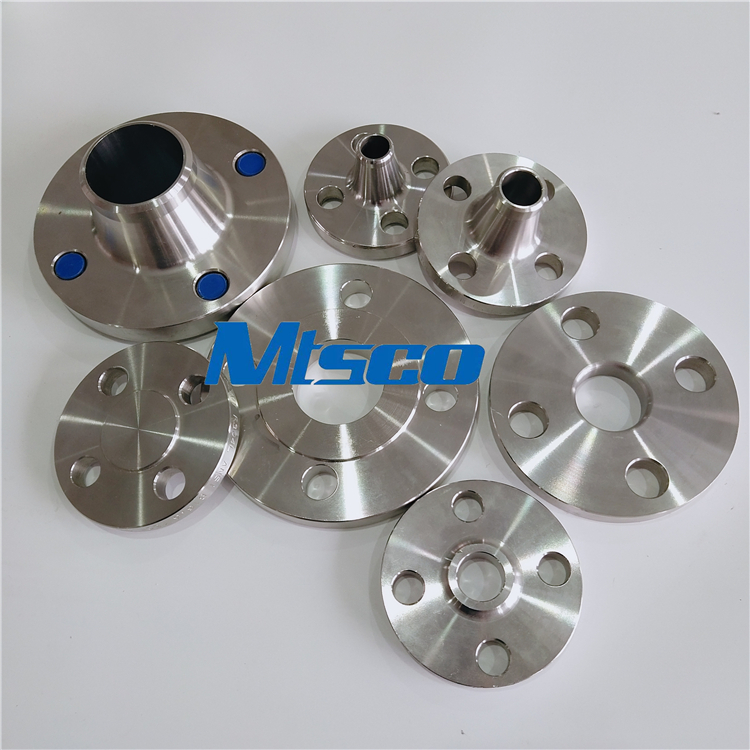Why should 304/ 316 not be used for flange joints?

Why should 304/ 316 not be used for flange joints?
In the actual operation of flange joint, bolt force relaxation is inevitable, and the bolt force of initial tightening will always drop with time. Especially for flange joints under high temperature and severe cycle conditions, after 10000 hours of operation, the bolt load loss often exceeds 50%, and attenuates with the extension of time and the increase of temperature.
When the flange and bolt are made of different materials, especially when the flange is made of carbon steel and the bolt is made of stainless steel, due to the different thermal expansion coefficients of the bolt and flange materials, after the device is heated up, when the expansion of the flange is less than that of the bolt, after the deformation is coordinated, the bolt elongation is reduced, which leads to the relaxation of the bolt force, which may lead to the leakage of the flange joint. Therefore, when high-temperature equipment flange and pipe flange joints, especially the thermal expansion coefficients of flange and bolt materials are different, make the thermal expansion coefficients of the two materials as close as possible.

The mechanical strength of 304 and 316 austenitic stainless steels is low. The room temperature yield strength of 304 is only 205mpa and 316 is only 210mpa. Therefore, in order to improve the anti relaxation and anti fatigue ability of bolts, measures to improve the installation bolt force must be taken. In this way, it is necessary to improve the strength grade of bolt materials and adopt high-strength or medium strength alloy steel bolt materials. Obviously, except for cast iron, non-metallic flange or rubber gasket, for semi-metallic and metal gaskets with high pressure grade flange or gasket stress, bolts of low-strength materials such as 304 and 316 can not meet the sealing requirements due to insufficient bolt force.

Stainless Steel Flange Products:
MTSCO – Austenitic / Duplex steel / Nickel alloy
– To be the most reliable industrial metal service provider in the world
Who MTSCO is?
MTSCO established in 2006, during many years development, nowbecomes a large and professional industrial piping system provider, serving customers from more than 100 countries and regions.

What products can we provide?


What materials can we provide?
Austenitic
304/L/H/N, 316/L/H/N/Ti, 321/H, 309/H, 310S, 347/H, 317/L904L
Duplex steel
31803, 32205, 32750, 32760
Nickel alloy
Alloy B/ N10001, Alloy B2/N10665, Alloy B3/N10675, Alloy C4/N06455, Alloy C22/N06022, Alloy C276/N10276, Alloy C2000/N06200, Alloy G35/N06035, Alloy G30/N06030,
Alloy S/N06635, Alloy N/N10003, Alloy X/N06002, Alloy 188/R30188, Alloy 230/N06230,
Alloy 556/R30556, Alloy 600/ N06600, Alloy 601/N06601, Alloy 617/N06617,
Alloy 625/N06625, Alloy 718/N07718, Alloy X750/N07750, Alloy 800/N08800,
Alloy 800H/N08810, Alloy 800HT/N08811, Alloy 825/N08825, Alloy 925/N09925,
Alloy 926/N08926, Alloy 400/ N04400, Alloy K500/N05500
Precipitation-hardening Steels: 254SMO/S31254, 17-4PH, 17-7PH, 15-7PH
Nickel: N4/UNS N02201, N6/UNS N02200
How can MTSCO service customers?
MTSCO’s ISO9001 Quality System is issued by TUV. Our full and professional inspection reports contain two parts, one is self-inspection of the requirements beyond ISO9001, which is 100% inspected by our own QC; another is 100% inspected by professional QC teams.

Thank you very much for reading this, I wonder if my presentation will help you with your current problem? Looking forward to hearing from you!
FAQ
1. Can you provide samples?
Of course, We can provide a few sample tubes for you to inspect and experiment.
2. Can we mark our logo on the product?
Yes
3. What is your packing?
Woven bags/Wooden boxes/Wooden reel/Iron reel and other packaging methods.
4. What inspection will you do?
In addition to routine surface and dimensional inspection. We can also do tensile, hardness and chemical composition analysis, and NDT like ultrasonic, eddy current, hydraulic testing.
5. What certificates do you have?
ISO9001/PED/AD2000/TS/ABS/CCS/BV/DNV……
6. What is your minimum order quantity(MOQ)?
According to different types of products, you can consult for details.
7. How long is your delivery time?
Products in stock: Within 5-7 days.
Customized products: 30-90 days, which is determined according to the product category.
8. What is your terms of payment?
T/T, L/C,O/A,D/P……



